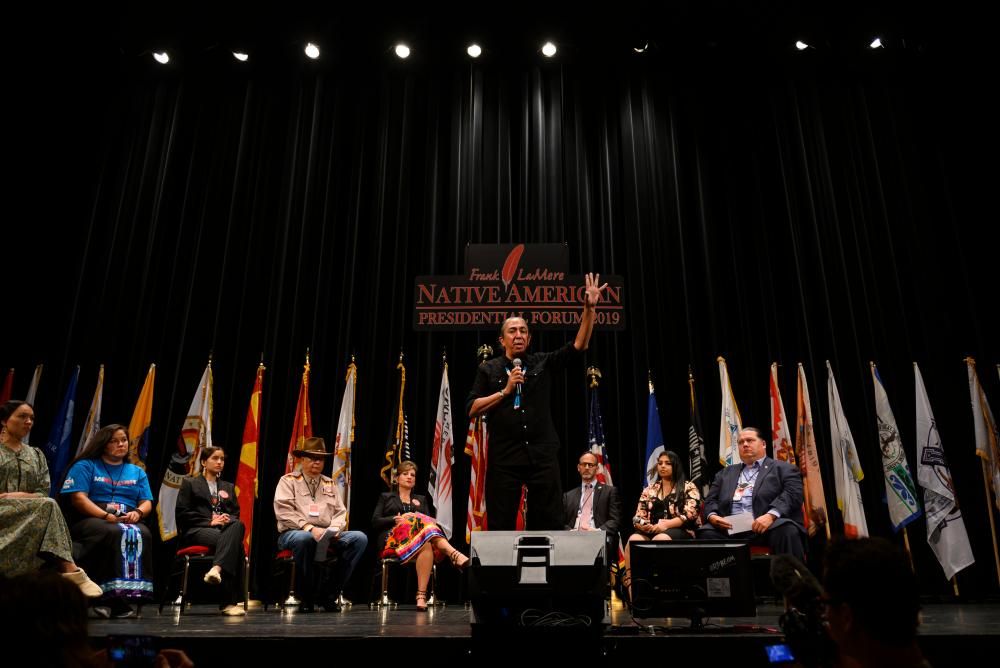In a video launching his presidential campaign, Mark Charles, hair tied in a tsiiyéeł, a Native American hair knot, introduces himself in the Navajo language.
“Yá’ át’ ééh. Mark Charles yinishyé,” Charles says.
“Tsin bikee dine’é nishłí. Dóó tó’aheedlíinii bá shíshchíín. Tsin bikee’ dine’é dashicheii. Dóó tódích’ íi’ nii dashinálí.”
Roughly translated, Charles is explaining that his father was Navajo and his mother Dutch American. What doesn’t need explaining is that if Charles were elected in November 2020, he would become the first Native American president of the United States.
It’s an extremely long-shot bid. But Charles is also aiming to use his campaign to raise awareness of the historic, and continuing, abuse of Native Americans and other ethnicities, hopefully resulting in an improved constitution that he believes would better reflect the modern-day US.
“Do we want to be a nation where we the people actually means all the people?” Charles says.
“Because if we do, then we have some foundational level work to do.”
Native American people living on reservations, Charles says, have always been overlooked by politicians. The territory of the Navajo Nation covers 27,000 square miles alone – enough to make it the 48th largest state in the US. Despite that, Charles says, the territory of 350,000 people is rarely visited by politicians running for president.
Charles is determined to change that with his campaign. He held his first campaign event on the Navajo Nation, at a chapter house – a communal meeting place – near Fort Defiance, north-east Arizona. His second event was at the Indian Pueblo Cultural Center, in Albuquerque, New Mexico, and another at the Denver Indian Center.
“Almost every state I go to I want my first contact to be with the indigenous nations, the indigenous peoples of that state,” Charles said.
“I really want to connect with them again because I’m coming on to their land to campaign and I want them to know me and to understand who I am and, and why, why I’m there.”
Charles believes he is the best person to lead the country as a whole, but he is also running with some ideas that would specifically help Native Americans, African Americans and other people of color. On the stump he talks a lot about creating a “common memory” – educating people on the atrocities committed in the past and the challenges different races face. Independent presidential candidate Mark Charles speaks on 20 August 2019 in Sioux City, Iowa. Photograph: Stephen Maturen/Getty Images
At the center of Charles’s platform is the establishment of a “truth and conciliation commission”, which would work towards creating that memory. His idea is modeled on the Truth and Reconciliation Commission set up in South Africa, after the end of apartheid.
“I don’t call ours truth and reconciliation because reconciliation implies a previous harmony, and if you know our history you know that’s not true.”
In South Africa the Truth and Reconciliation committee hearings, which allowed both victims and perpetrators to explain their experiences, were broadcast live, in what has been described as the “gold standard” for how a divided society might deal with a violent past. Charles believes his committee could eventually lead to an at least partial rewriting of the US constitution.
Charles said he had the idea for “that type of conversation years ago”.
“But I did not know the best way to bring that proposal to the nation. And after observing several presidential campaigns, I realized every four years we have a dialogue about who we are and where we’re going: our presidential campaign cycle.
“So I felt like this is an important enough of a proposal that it actually could very well be the center of a presidential campaign. So one of my motivations in running for president is to raise this issue of truth and conciliation to the national level.”

Charles grew up in New Mexico, and went to university in California, before spending 11 years living in the Navajo Nation, which is spread across Arizona, Utah and New Mexico.
Three of those years were spent on a remote sheep camp, where Charles and his young family lived in a one-room hogan, a traditional Navajo house, which had a dirt floor, no running water, no electricity and was six miles from the nearest paved road.
Charles isn’t the first Native American to run for the White House. Russell Means, an activist from the Lakota tribe who died in 2012, ran for the Libertarian party nomination ahead of the 1988 election, but came second to the Texas congressman Ron Paul.
In 2018 there was a breakthrough for Native American women in particular, when Sharice Davids, from Kansas, and Deb Haaland, from New Mexico, became the first Native American women to be elected to Congress. Both Davids and Haaland are Democrats. Charles says he has voted for both Democrats and Republicans in the past, but believes his best chance for office is to eschew both parties.
“I don’t want people to think that becauseI’m running as an independent I’m not a serious candidate,” Charles said. He believes he would not clinch the Democratic or Republican nomination – aside from anything else, he isn’t a member of either party – but he plans to be on the ballot in all 50 states, and is committed to running all the way through to November.
“If our country does not begin creating this common memory, and does not make a decision on whether we want to be a place where we the people means all the people,” Charles said, “We’re going to continue to face these deep racial divides that we’ve had in our country since its founding.”
The Yucatan Times Newsroom with information from The Guardian

